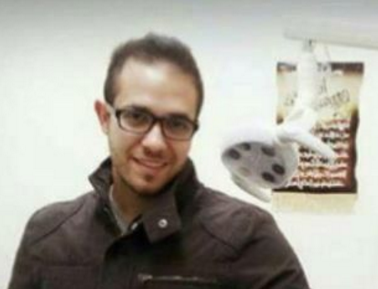Former Palestinian detainee Mahmoud Balboul spoke out, on Sunday, about his experience undertaking a weeks-long hunger strike, last year, and urged Palestinians everywhere to stand in solidarity with a mass hunger strike currently underway in Israeli prisons.
Mahmoud Balboul refused food for 79 days, after launching a hunger strike last July, and was joined by his brother Muhammad two days later, who refused food for a total of 77 days.
They both suspended their strikes after reaching a deal with Israel, stipulating their release from administrative detention — internment without charges or trial, a practice that has become a main target of the ongoing mass hunger strike.
According to Ma;an News Agency, the Balboul brothers attended a sit-in tent in their hometown of Bethlehem, in the southern occupied West Bank, on Sunday, among a number of similar tents set up across the occupied Palestinian territory in solidarity with approximately 1,500 imprisoned hunger strikers.
“Going through a hunger strike, whether undertaken individually or as part of a mass strike, is not easy,” Balboul said. “It feels as if you are entering the unknown, but it is the only way to achieve your demands and gain freedom.”
“It is of the utmost importance for the people to stand with the families of Palestinian prisoners first, and the hunger strikers themselves second, because a hunger-striking prisoner has prepared himself politically and psychologically for the experience — he has already gone through so many difficulties that have enabled him to adapt to any situation, despite all obstacles,” Balboul continued.
Speaking of his own experience, Balboul stressed that his brother Muhammad’s participation emboldened him to continue in the hunger strike against all odds. “A hunger striker needs support and solidarity to be able to continue,” he said.
“I was in a critical medical condition — I lost the ability to walk. For a time I was also in solitary confinement, completely isolated from the outside world.”
Balboul said that Israeli authorities “tried to break Muhammad’s will,” who was still able to walk, by putting them in hospital beds next to each other. “But he remained strong and kept patting my hair, talking about our coming freedom, our family, our dreams, which helped me regain my strength.”
He said that there were only two occasions upon which he felt defeated by the weight of his emotions. First, when an International Committee of the Red Cross (ICRC) employee delivered him a letter from his mother that told him to stay determined; and second, when he was put in a solitary confinement cell under exceptionally miserable conditions.
“The cell had a putrid smell, and chlorine was poured all over the floor. Bugs fell from the ceiling on my head. I used to scream again and again for water.”
Balboul directed a message to all Palestinian prisoners on hunger strike, telling them to stay strong and not listen to Israeli authorities’ lies and rumors, which he said were only circulated to break the will of the hunger strikers. “Just focus on achieving your goal and stay calm. Think of freedom, and you will stay determined. When you are determined, you will reach victory,” he said.
In a message to the families of hunger strikers, the former prisoner said: “Your sons are stronger than this, stronger than what they are being put through. Pray for them and do not leave them alone.”

